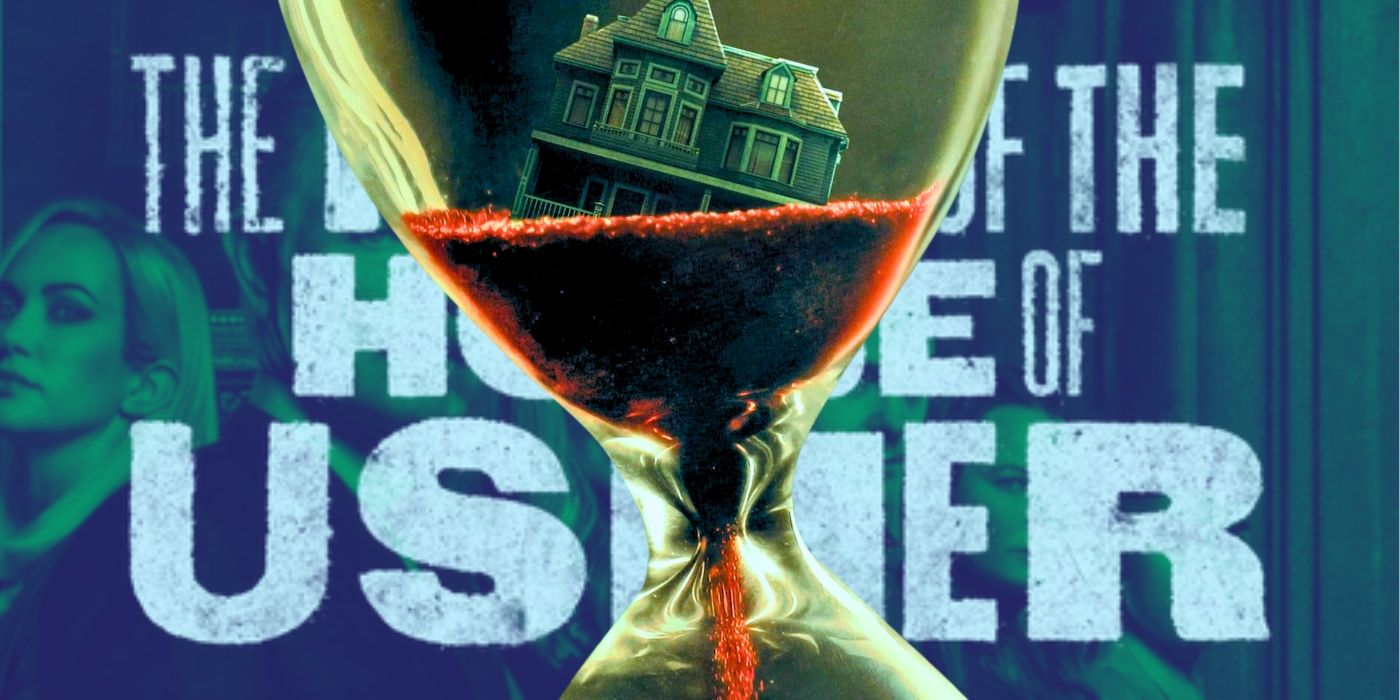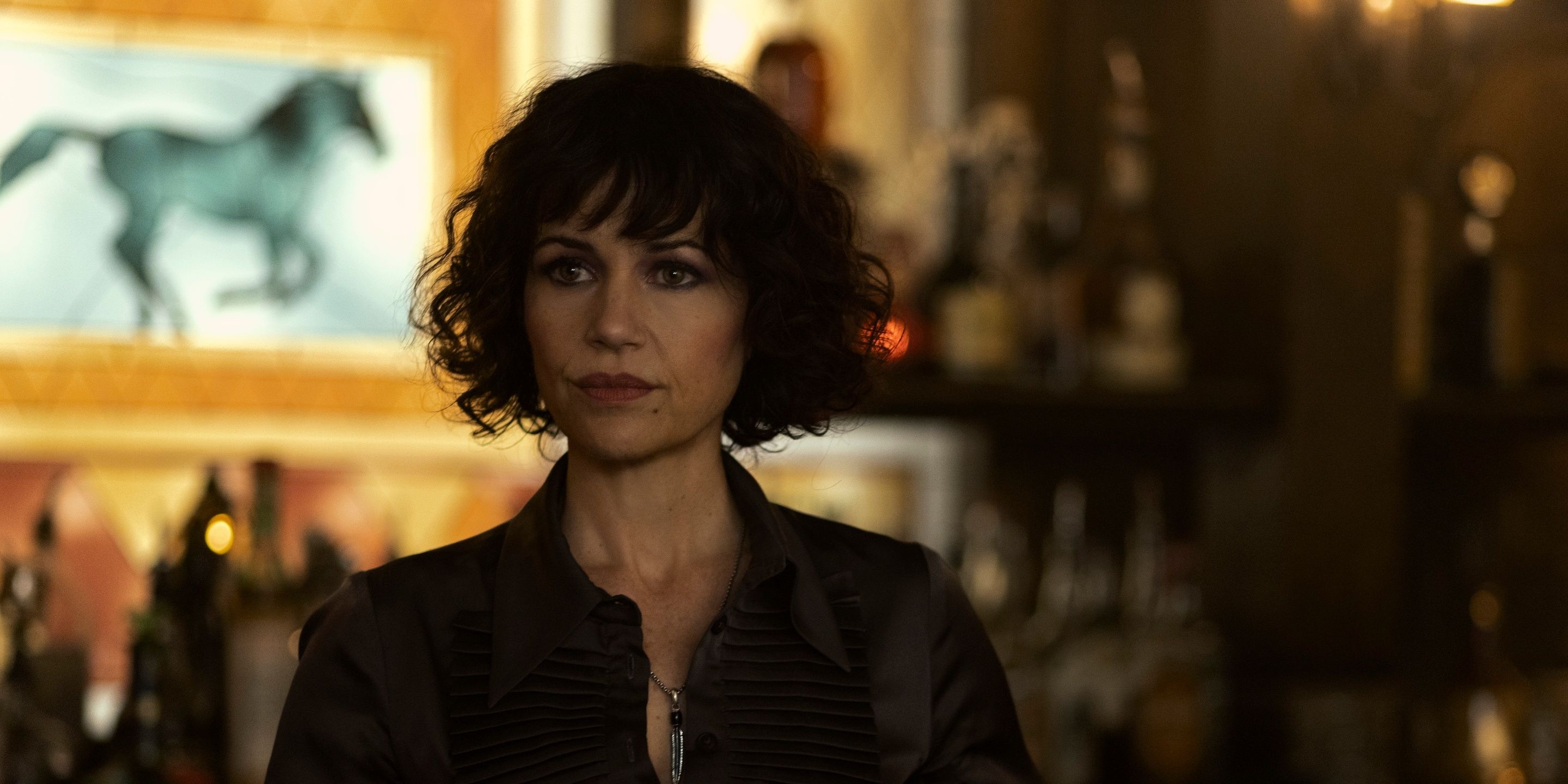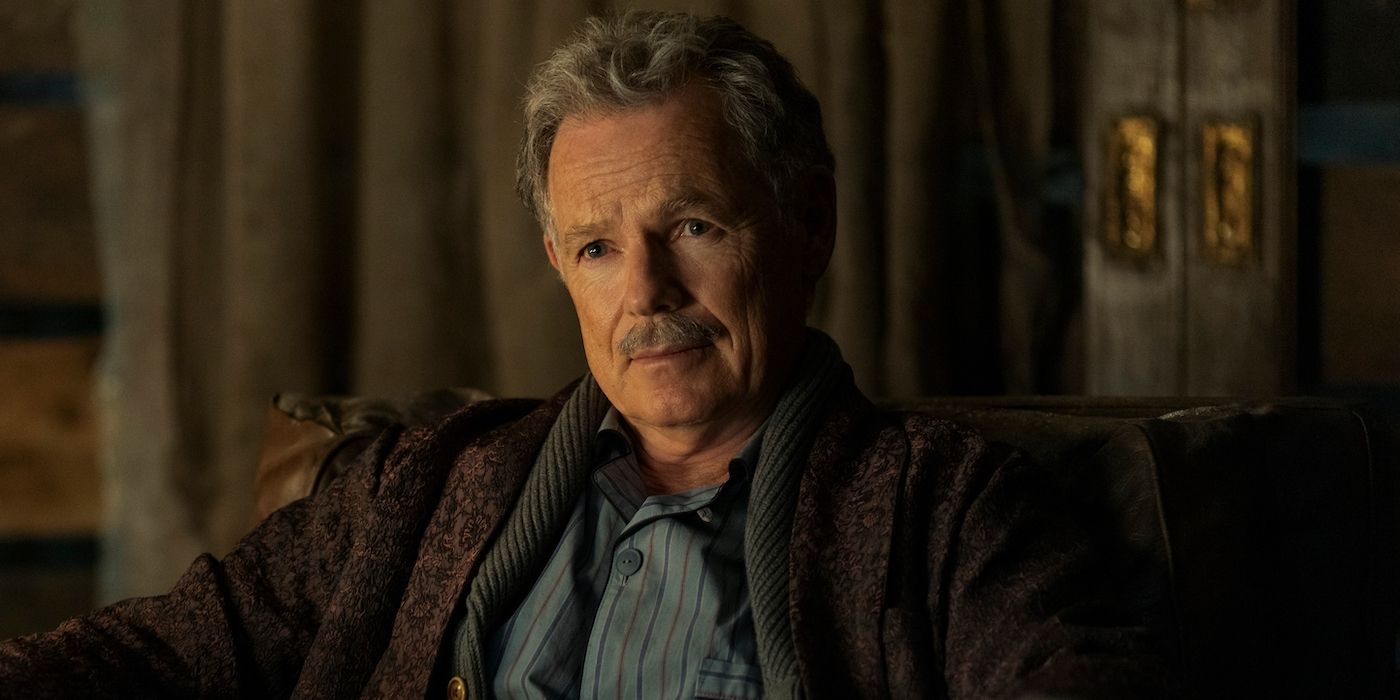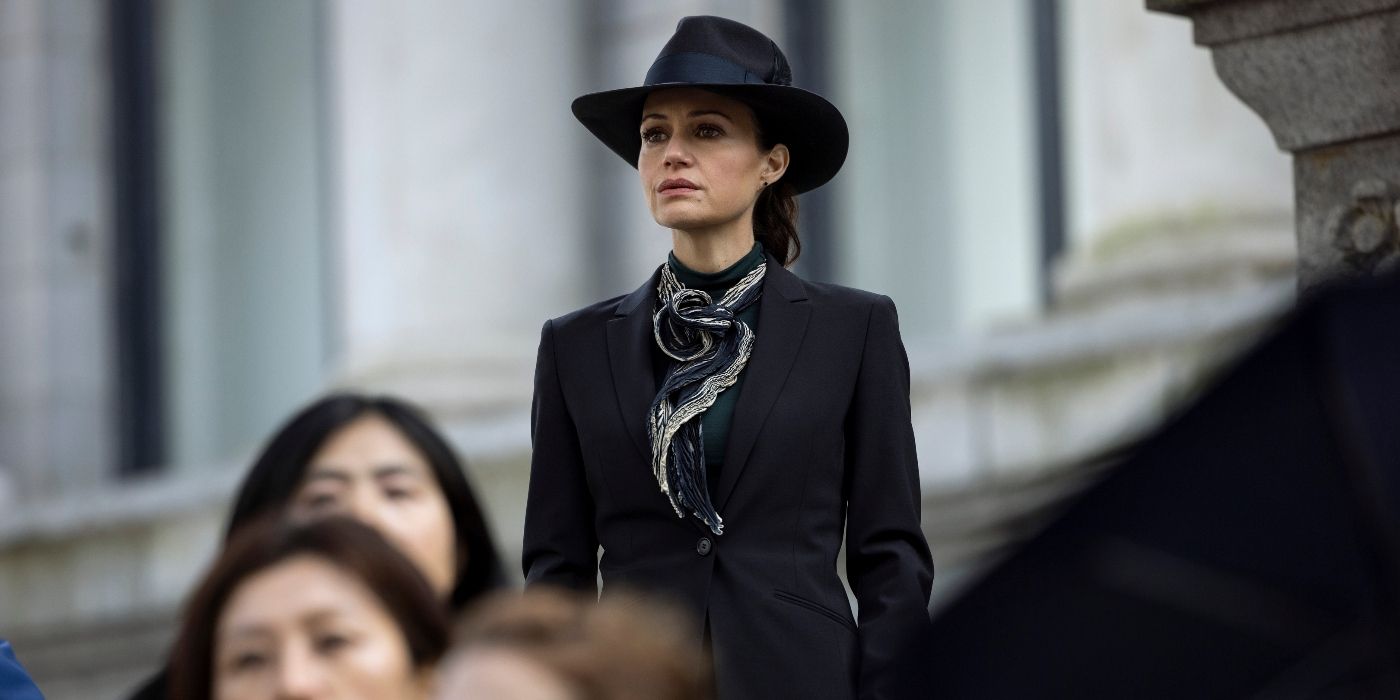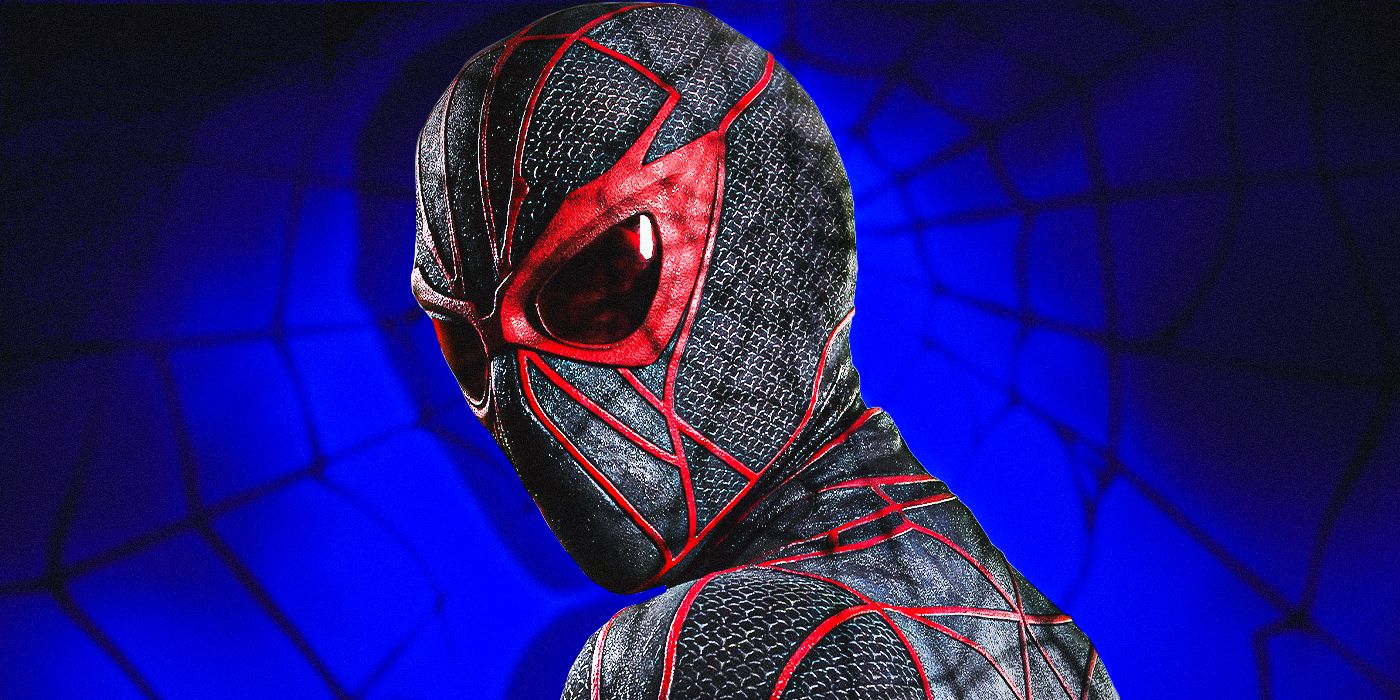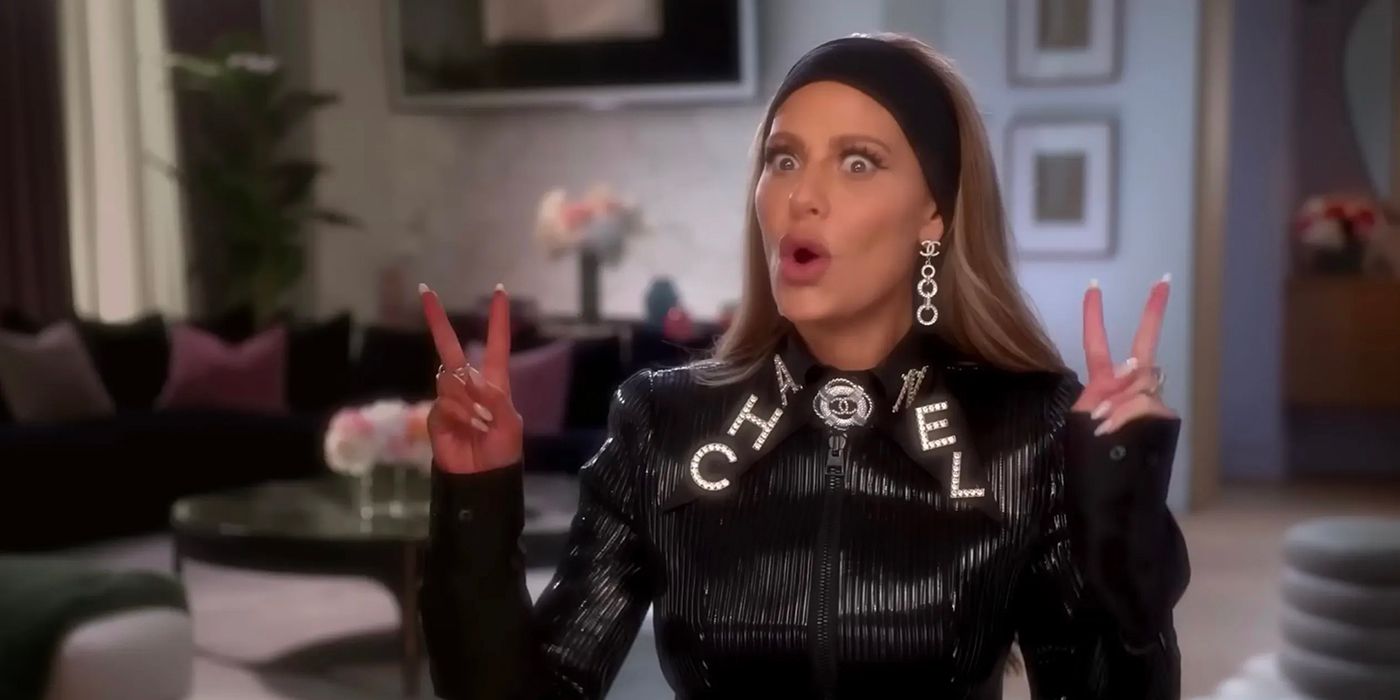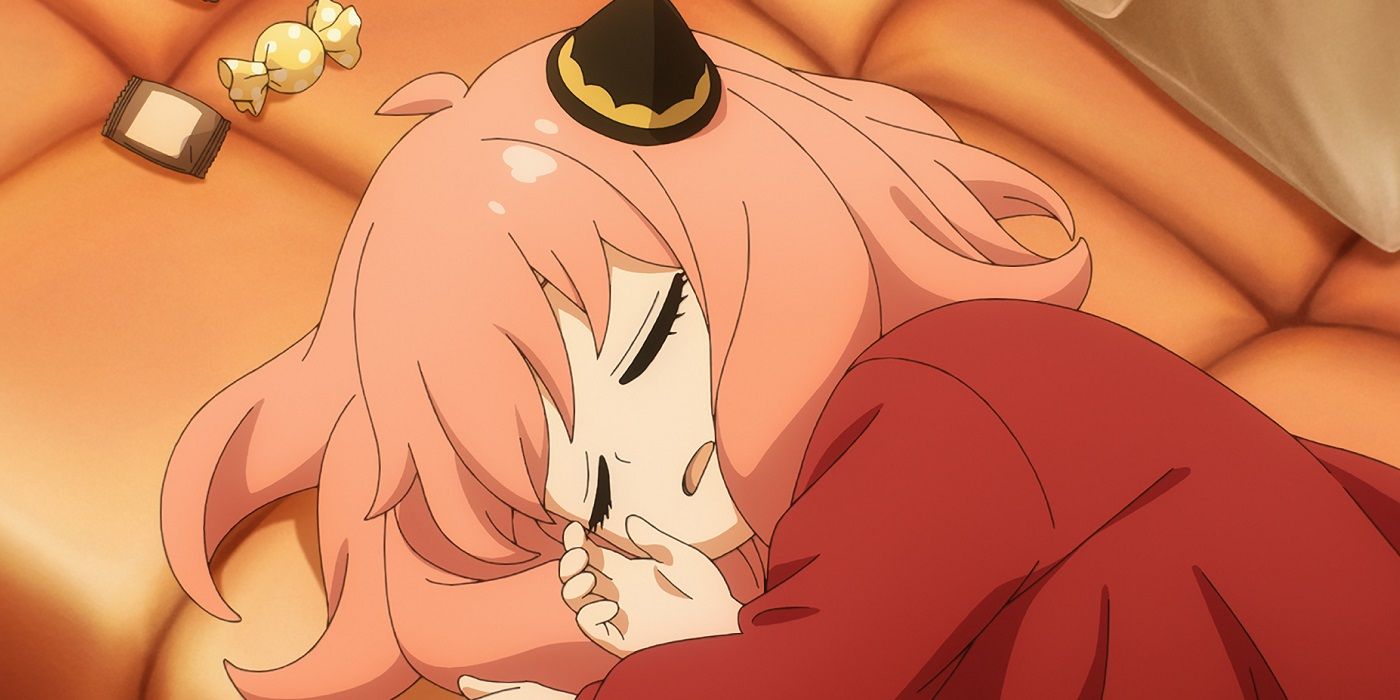Editor’s note: The below contains spoilers for The Fall of the House of Usher finale.
The final episode of The Fall of the House of Usher is an eventful hour of television. A lot is revealed about what crime Madeline (Willa Fitzgerald) and Roderick (Zack Gilford) committed when they were young, what the nature of their deal with Verna (Carla Gugino) is, why the Usher children died the way they did, and what happened to Auguste Dupin’s (Carl Lumbly) investigation on Fortunato’s role in the opioid epidemic.
But even though “The Raven” is an episode packed with plot, it is also full of mysteries that can’t be readily understood on a quick watch. How exactly does Roderick and Madeline’s agreement with Verna work? What is the meaning of Verna’s visit to the Ushers’ final resting place? Why does she leave them those gifts? Heck, who even is Verna? These are all questions that linger on after a first view of The Fall of the House of Usher‘s beautiful finale. And in case you were left wondering about any of these matters upon watching “The Raven,” do not despair. Here’s a breakdown of the most important things that happened in the eighth and final episode of Mike Flanagan‘s newest Edgar Allan Poe-inspired horror series.
Who Is Verna, Exactly?
Maybe the question should be: what is Verna? The final episode of The Fall of the House of Usher gives us even more reasons to believe that Verna is not a regular human being, but a supernatural entity of some sort — reasons that were already plenty throughout the rest of the series. First, there are her powers of suggestion, which she uses both to get the waitstaff out of Prospero’s (Sauriyan Sapkota) party in Episode 2 and to trick Frederick (Henry Thomas) into adding some of the nightshade paralyzer to his coke in Episode 7. Then there is the fact that she can manipulate reality, trading places with rabid chimps and making ugly rats look like adorable kittens. The evidence of her inhumanity just keeps on piling up: there’s her presence in photographs of influential people dating back all the way to the early 20th century, and there’s Madeline (Mary McDonnell) trying to kill her only for her to pop up somewhere else in the room entirely, as well as the bar that never actually existed…
In “The Raven,” we get some extra tips that point to Verna being something otherworldly. First, she brings Roderick (Bruce Greenwood) back to life after his Ligodone overdose. Then, in the 1970s part of the episode, we learn that the pact she made with Madeline and Roderick took place somewhere outside of space and time and that her bar ceased to exist the minute the Usher twins walked out the door. Paralleling Madeline’s scene in Episode 7, Arthur Pym also tries to kill Verna with a lethal injection only for her to escape unscathed and follow it up with a conversation about human cruelty and would-be pacts. Finally, she turns into a raven after leaving her gifts atop the graves of the Usher family.
But none of this explains who or what exactly is Verna, and, to be fair, The Fall of the House of Usher does leave this question kind of hanging in the air. The miniseries never gives us a definite answer. And, though the mention of pacts seems to point to Verna being the devil, that doesn’t seem to be the case. While other Mike Flanagan works, such as Midnight Mass, have some pretty heavy Christian undertones, The Fall of the House of Usher does things such as straight-up denying the existence of souls that undermine a more direct message in that sense. The best answer that we get in terms of who or what Verna actually is comes from Madeline in her final conversation with Roderick, in which she calls Verna “Death herself.” However, this is still an assumption on her part, so we should take it with a grain of salt.
What Is Verna’s Deal With Madeline and Roderick?
Though we know from Episode 1 how Verna came into the lives of Madeline and Roderick Usher, it is only in the finale that we learn what exactly this first encounter entails. In the 1970s, Madeline and Roderick go into Verna’s bar looking to be seen so that they can forge an alibi after killing Rufus Griswold (Michael Trucco) by walling him up in Fortunato’s basement. While at the bar, they strike up a conversation with Verna, who becomes extremely interested in the Usher siblings’ lust for wealth and power. Once the place is empty, she sits at a table with them and makes them an offer: everything that they’ve ever dreamed of in exchange for the lives of their heirs. More specifically, she wants their bloodline to die with them, which is why Roderick begins to lose his kids right after being diagnosed with vascular dementia: if he doesn’t have much time ahead of him, neither do his children.
Verna does offer Madeline and Roderick a choice, though. She tells them that they can say no to her deal and that, this way, their children will love longer lives, albeit with a lot more struggle. Roderick, however, doesn’t even blink before choosing the alternative that comes with money, showing without a shadow of a doubt where his priorities lie. Roderick Usher has always been about the money, both because he thinks it makes life easier, which is fair enough, and because he can use it to control others around him. He uses his money to buy governments and companies as well as the love of his children: in “The Raven,” we see a conversation between him and Annabel’s (Katie Parker) spirit in which his ex-wife accuses him of showering Tamerlane (Samantha Sloyan) and Frederick with material possessions in order to drive them away from her.
Besides showing Roderick’s true colors, the Ushers’ pact with Verna also serves as the show’s biggest social critique. Much like other billionaires around the globe, Roderick and Madeline Usher made their money on the backs of not only the poor but also of future generations. They drowned the world in despair with their allegedly pain-erasing drug, and now it’s up to the young to deal with the horrors that they created, whether by trying to make something else out of the Usher name or by picking up the pieces after their families have been destroyed by addiction and overdoses. Or, you know, by dying as a result of a contract with an otherworldly entity. “Let the next generation foot the bill,” Verna tells them, and that’s what the next generation does, whether or not they carry the Usher name.
Why Do Roderick and Madeline Kill Each Other?
While Roderick Usher had a ton of children to foot his bill, Madeline took a different approach to her conversation with Verna: she got an IUD some time after leaving the bar in order to guarantee that she would never have any heirs to pay for her crimes. This, however, isn’t enough to protect her from Verna when she comes to collect her part of the bargain. Neither are her attempts to kill her brother, believing that this would put an end to the bloodshed. Verna was pretty clear that Roderick and Madeline would have to die side by side: “You came into this world together, and you go out of it together.”
So, when Roderick mummifies Madeline, replacing her eyes with the two sapphires belonging to an ancient Egyptian empress that he paid good money to smuggle out of Egypt as a birthday gift for his sister, we should’ve realized that Madeline wouldn’t stay dead. After all, Eliza’s (Annabeth Gish) story in Episode 1 had already shown us that Usher women have a thing for coming out of the grave to get back at the men who wronged them. While Roderick is chatting with Dupin, Madeline is still alive and making a lot of noise trying to get out of the basement. When she finally succeeds, she kills her brother with her own two hands and drops dead by his side, both evoking her mother’s murder of Mr. Longfellow (Robert Longstreet) and fulfilling Verna’s prophecy.
What Is the Meaning of Verna’s Final Visit to the Ushers’ Graves?
With both Madeline and Roderick Usher dead, as well as all of their heirs, Dupin’s case against the family goes down the drain. After Juno (Ruth Codd) inherits the company and immediately dissolves it, there isn’t even anything left to prosecute. The only person who actually gets convicted of something in the case of the United States government against Fortunato Pharmaceuticals is Arthur Pym (Mark Hamill), who finds himself incapable of making a deal with Verna due to his lack of collateral: he has no heirs or loved ones whose lives he can offer. Rendered utterly useless, the statement that Roderick gave Dupin is left intact in its tape recorder by the side of his grave.
But Dupin isn’t the only one to pay a visit bearing gifts to the final resting place of the Usher family. Verna also drops by. While we hear her voice reciting Edgar Allan Poe‘s poem “Spirits of the Dead,” she silently leaves for each of the Ushers a token that she collected from them. Poe is, of course, the big inspiration behind The Fall of the House of Usher. As for the tokens, it is said that young ravens are attracted to shiny objects and collect them as a way to impress other members of their species. Owing to her animal form, Verna too collects shiny objects belonging to her victims. However, these objects are not shiny in a literal sense: they sparkle because they are important to the person that owned them, because they are the only thing that they could see while their life was crumbling around them.
The mask that she leaves atop Prospero’s grave is a reminder of his obsession with inconsequential hedonism, while Camille’s (Kate Siegel) phone represents her compulsion to spy on everyone, even her own siblings. The collar given to Leo (Rahul Kohli) is the one thing he obsessed over after replacing his boyfriend’s cat with another animal as if a pet was nothing more than a trinket. Victorine’s (T’Nia Miller) heart mesh was so important to her that she falsified data and even killed her own girlfriend over it. Tarmelane’s golden bug symbolizes the wellness empire that she sought to build to the detriment of her marriage, and Frederick’s bag of coke laced with a nightshade paralyzer stands for both his addiction and his torture of Morelle (Crystal Balint). Madeline is gifted the sapphires that Roderick got for her as a symbol of the eternal life she was so fixated upon: in Ancient Egypt, the jewels were part of the afterlife kit the pharaohs were given in their final resting place, meant to serve as eyes in the other realm. Finally, Roderick’s glass stands for the cognac he drank with Verna, sealing the deal that would cost the lives of his children.
The only member of the Usher family that was not hung up on material things was Lenore. Thus, she is also the only member of the family who doesn’t get a shiny thing taken from her at the moment of her death. After all, she has nothing to give besides her love for others. So Verna gifts her a token of her own appreciation: one of her black feathers tied to a white rose, both fleeting, yet beautiful, living things that will pass naturally and peacefully, much like Lenore did.
The Fall of the House of Usher is currently available to stream on Netflix.

